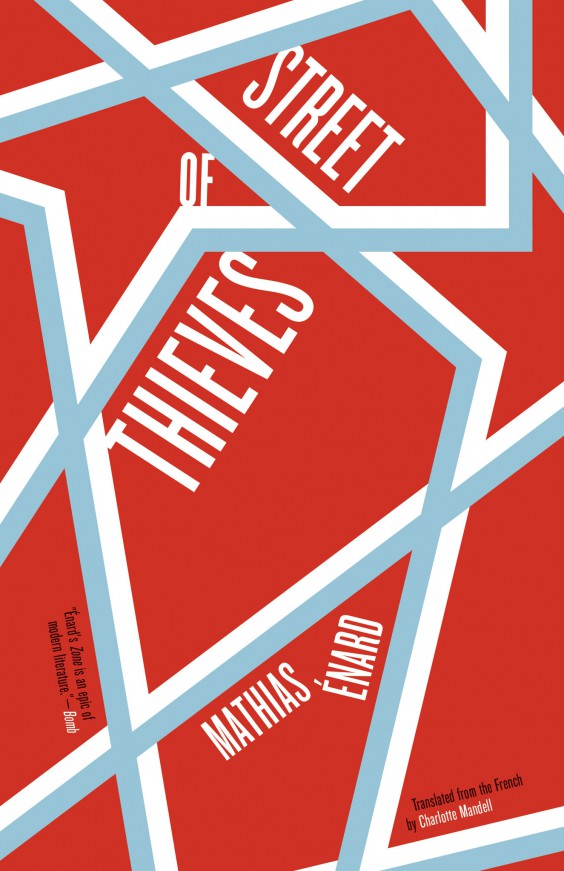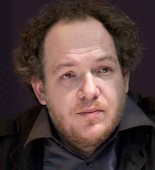Excerpt from Street of Thieves by Mathias Énard
by Open Letter / December 15, 2014 / No comments
So I was free as the air, I went to sit on the Plaça del Sol, on a bench, I read a thriller by Vázquez Montalbán for a few hours; his detective, Pepe Carvalho, was the most disillusioned, pretentious, antipathetic guy on earth; his plots were incredibly boring, but his passion for food, sex, and the city ended up making his books amusing. In the end, I learned quite a few things about Spain and Barcelona, and some new words and expressions that were always useful. Once I’d finished the book, I made my way to the center of town. The helicopter was still wheeling around, lower down; the wind carried a burnt smell, layers of smoke weighed down the air; distant police sirens ripped through the seeming calm of the streets and when I emerged at the corner of Avinguda Diagonal, in front of one of the largest hotels in Barcelona, I encountered hundreds of people with signs; black and red anarchist flags floated on the obelisk, brandished by dozens of demonstrators who had climbed the pedestal; the crowd seemed to be occupying the entire Passeig de Gràcia. The window of the Deutsche Bank had been shattered by a hammer; I saw a group of young people attacking the savings bank next door, chanting and spraying graffiti with red spray-paint—the helicopter was very close now, above us, it must have been observing the activists; down below, toward the Plaça de Catalunya, immense columns of smoke rose to the sky and you could see the glimmer of flames—the city was burning, to the sound of loudspeakers shouting slogans, chants, music of all sorts, sirens, it was a deafening, brutal, blinding spectacle, which made your heart beat in unison with hundreds of thousands of motionless spectators, prevented from moving by their own numbers; the closer I got to the heart of Barcelona, along side streets, the more fires there were—in the middle of an avenue, a barricade of trashcans was burning itself out with a hellish smell. On Plaça Urquinaona, there was a pitched battle — in the flames and smoke, a multitude of young people, compact and moving, were advancing against two police vans, throwing their flagstaffs, bottles, trash at them, then spreading out in disorder when the vehicles began moving, two fat marine-blue creatures, their eyes covered by metal grills, which quickly belched out their occupants, helmeted, wearing gas masks: some were carrying rifles, they began shooting into the crowd, flashing detonations from the barrels of their weapons — the young people moved back under the hail of rubber bullets and the tear gas; some of them, scarves over faces to protect themselves from the gas, continued their offensive — they had nothing left to throw except insults.

- Set against a backdrop of uprisings — the Arab Spring, the Occupy movement, and Islamic extremism —Street of Thieves follows Lakhdar, a young Moroccan, who becomes exiled from his family for his religious transgressions. On the streets of Barcelona, he hides from the police and the radical Islamic group he worked for in Tangier, transforming from a boy into a man, from a devout Muslim into a sinner.
- Mathias Énard is a professor of Arabic at the University of Barcelona. His 2010 novel, Zone, was the recipient of several awards, including the Prix du Livre Inter and the Prix Décembre. Street of Thieves was translated from the French by Charlotte Mandell, and published by Open Letter Books.
I was at the side of the street, sheltering with some other passersby in a doorway. Opposite us, a fire-truck was trying to control the flames emerging from a Starbucks, a glaring symbol of American capitalism, whose windows hung in tatters, a strange cloth of broken glass. From time to time, a cop would advance, shoulder his weapon, and aim calmly, before falling back in with his colleagues, like a hunter or a soldier, and one wondered what effect these projectiles could have, so extraordinarily violent and frightening were the shots.
To get to the Street of Thieves, I had to cross the police line — or else retrace my steps, walk toward the university and from there burrow into the Raval, but I thought the university square would also be on fire, if not under fire and sword.
Subversion was everywhere, you could feel the violence and hatred of the boys in blue rising: they were rushing around, restlessly brandishing their long clubs, their rifles, their shields — opposite them, the young people lowered their pants to show their asses, called the cops assholes and sons of whores; a little group dismantled some metal trashcans to throw at them, others, oddly, attacked a tree, maybe to turn it into a giant spear. The confrontation was unequal and reminded me of a battle of conquistadors, with armor and harquebuses, against a troop of Mayan or Aztec civilians I had seen an engraving of in a history book. Conquest was on the march.
The moment I decided to go behind the forces of order to try to cross, the charge began. About fifteen of the fuzz ran forward, clubs in hand; four others covered their flanks and headed toward us, shoved us bluntly aside, a respectable gentleman in his fifties began shouting, saying he lived on the other side of the street; the masked cop yelled Clear the way clear the way, he landed his club in the gentleman’s back, who ended up taking to his heels, indignant, tears of rage in his eyes—we had to surge back to the upper part of the city, which is precisely the opposite of where I had to go. Violence and hatred; I felt rage rising within me, rage and fear; I tried to call Judit on her cellphone to find out where she was—no signal. The police must have cut off the networks to prevent demonstrators from coordinating with each other via texts.
The city was wavering between insurrection and festivity—the Gran Via was still full of people, I passed an old lady carrying a sign saying “He who sows poverty reaps rage,” a little girl holding the string of a balloon that read “Enough budget cuts,” students chanting Rajoy, chulo, te damos por culo, Rajoy, you pimp, we’ll give it to you from behind, and other pleasantries along those lines, in the stench of burning trash and teargas strangely, a little bar tucked behind some scaffolding was open, I decided to take a rest and wait for things to calm down a little. I ordered a coffee which I eked out—the TV was showing the day’s events live, I saw the battle scene I had just been part of on Plaça Urquinaona, taken from a different angle: it was a very strange sensation to think that behind those policemen, on the left, at the corner of Carrer Pau Claris, they could have seen me. The TV was the periscope of a lost submarine.
Night fell. I was afraid of being arrested along with a group of activists by accident, so I decided to make a big detour to get to my neighborhood, my fortress, the Palace of Thieves: to go by Carrer Diputació to Villaroel, go down to the Sant Antoni Market and enter the Raval by Carrer Riera Alta. A detour that took a good forty-five minutes, but that should prevent me from finding myself by chance in the midst of a club-wielding horde of police. On Diputació, at every street corner, you could see, five hundred meters lower down on the left, around Plaça de Catalunya, the white emanations of gas mingling with the black smoke of trashcans on fire. I managed to meet up with Judit—she had left the demonstration to go back up to her place when the cops charged at the corner of Diagonal and Passeig de Gràcia; her voice was hoarse; I asked her if she was all right, yes yes, she answered, of course; I didn’t press further.
The detour was a good idea—aside from local policemen on motorbikes who prevented the cars from reaching the center, I passed only groups of store owners talking in front of their half-closed shops, or young people with grave, frightened faces climbing up from University Square.
The two temporary buildings of the Sant Antoni Market were a gateway in imaginary ramparts; behind them opened the Raval and, in its heart, the Street of Thieves—I was safe. God knows why, the neighborhood was blacked out. No street lights. Maybe an effect of the strike, or a coincidence; a few shops were open and threw a
strange wavering glow onto the asphalt, adding an even more medieval look to our castle of the poor. On Carrer Robadors, nothing had changed: our blacks were keeping a lookout at the corner, waiting for God knows what that never arrived; Maria was in front of her door, skirt hiked up to mid-thigh; fat cockroaches scurried out of my way as I climbed the stairs; Mounir was in front of the TV, feet up on the coffee table, in socks. I collapsed next to him on the sofa, worn out—I had walked for almost four hours.
The TV showed the images of the day on loop.
I began to play mechanically with the knife that Mounir had placed on the table as usual; it was a short but wide weapon, very sharp; a spur of metal kept the blade from folding back in once opened, a very powerful spring you had to release to close it back up. The handle was short, steel, covered with two pieces of red wood. Solid, sharp, dangerous. I asked Mounir if he’d used it yet, he said no, in your dreams, I haven’t even taken it out of my pocket in front of anyone. It’s just a security measure, you never know.
You do, in fact, never know.
On TV, the commentaries remained the same.
The unions were delighted with the strike’s great success.
The government was delighted to be able, starting tomorrow, to resume its indispensable economic reforms.
In the distance, the helicopter still circled.
Sampsonia Way reproduced this excerpt with the permission of Open Letter Books. Copyright Open Letter Books, 2014.






